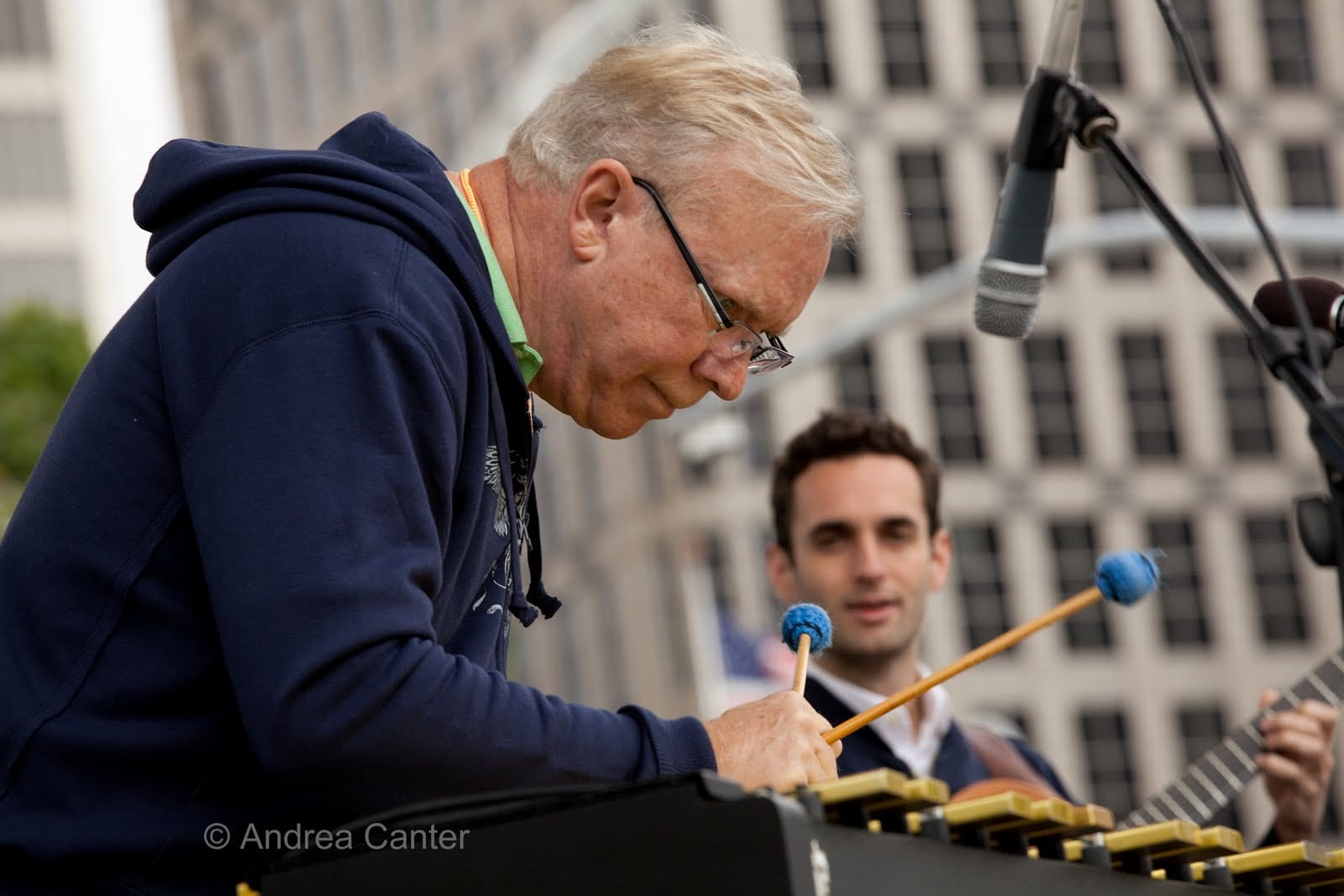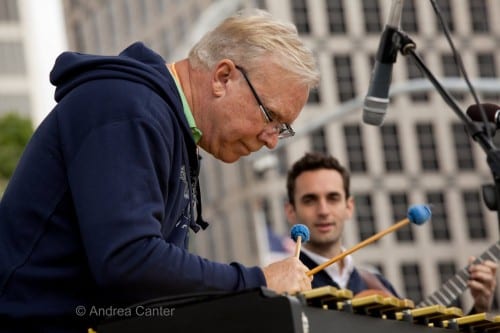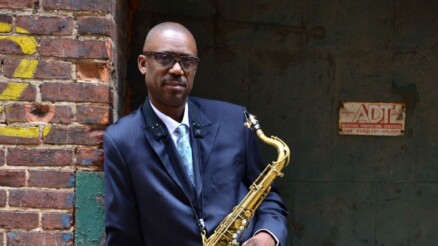Interview | Gary Burton & Julian Lage: The legend and his famous protégé answer five questions


by Giovanni Russonello
Editorial board
Listen to the vibraphonist Gary Burton’s recently released recording, Guided Tour, and you might be lulled at first by its grace and firm footing. It could take you until the second or third listen to notice something else: the range. Like everything Burton does, Guided Tour takes its direction from an insatiable taste for new discoveries.
As the pioneer of the four-malette technique, an early (some say the earliest) innovator of jazz-rock fusion, and an explorer of vibraphone tango music, Burton has never sat still. In recent years, the famed vibraphonist — who turned 70 this year and last month published an autobiography, Learning to Listen: The Jazz Journey of Gary Burton — has found a musical accomplice, acolyte and protégé to tackle this stage of the journey with him.
That man is Julian Lage, a 25-year-old virtuoso guitarist who has been playing with Burton since he was 12 years old and who has released two excellent albums of his own since moving to New York City in 2008. Like Lage, Burton was a child prodigy in his day: By his mid-teens he was playing jazz and country in bands around the Midwest, and at 18 he recorded vibes on a semi-classic album by Hank Garland, a country guitar player. Burton and Lage also share a love for various styles of music, from Western classical to country and Appalachian folk, and a dedication to beautiful, lapping currents of melody.
The New Gary Burton Quartet — featuring Lage, Scott Colley on bass and Antonio Sanchez on drums — plays Blues Alley this Thursday and Friday. In advance of that show, I caught up with Burton and Lage for separate phone interviews. I wanted to get a feel for how these two prodigious talents who have so much in common, but are at such different points in their careers, might line up. So I asked them each a set of the same five questions; here are their answers.
CapitalBop: How has your relationship grown over the years?
Julian Lage: We have played together in some format every year since I was 12. Gary would always book some kind of tours to always keep us engaged. To be honest, I’m still not over the shock after 13 or 14 years – it’s like, “Really, I get to do this with him?” He’s still generous and kind. In a lot of ways it hasn’t changed.
I think what’s changed is just my appreciation of the bigger picture, and the bigger trajectory of Gary’s career. Because as I get older I see myself in similar situations to what he’s been in – putting together a band or releasing an album. Sometimes I’ll ask myself how he would do something, and it helps.… That’s such an important thing about Gary: he never treated me like a kid. It was always as a colleague, and I was there because he felt I had something to say – even before I felt I did, or trusted that.
Gary Burton: I discovered Julian when he was on the television show of the Grammys one year. He was 12 years old, and playing with this group of kids to promote music education. He only played for about 20 seconds of soloing, but it was very good – natural and comfortable-sounding. I decided I had to find out more about this kid. So I called him up, talked to him and his parents, and I invited him to come and play w me at a TED conference. That went really well, and based on that experience I started to come up with low-key gigs we could play together. We took a cruise across the Atlantic on the QE2. … Things went like that for two years, till he was 15. Then he sent me a demo tape and I was so impressed I decided it was time for us to make a record together…. We didn’t play much for a few years while he was in college and I was out on a world tour with Chick Corea …. When I returned, reuniting with Julian seemed like a good idea.
The big question mark with child prodigies is, will they go ahead and live up to expectations? I’m gonna assume 80 percent of the time it doesn’t happen. It’s a very common story – they’re amazing as a 10-year-old or a 15-year-old, but then something happens and they plateau and don’t grow past a certain point. I was a child prodigy myself, so I’m keenly aware of the circumstances. Julian was one of those guys from the beginning that I thought was gonna keep right on going. He was so focused and he had such a large interest: He composed, he practiced … and his parents were wonderful stage parents without pushing him to succeed. He really did it on his own. He has an increasingly broad range of things he can do.
CB: What is the No. 1 thing – about yourself, this music, business, whatever – that you know now but you were mystified by when you first started playing professionally?
JL: I’m reminded of this Ornette Coleman quote; basically it’s like, the day he realized that making mistakes was part of it, that’s when it all opened up for him. The thing that connects all of us musicians and even non-musicians is not the things we’re great at. It’s the things we struggle with that we can empathize with each other over….
People spend so much energy trying to not look bad. There’s a big difference between investing in not sucking and investing in actually being a musical explorer.
GB: When I first started, I didn’t know how you can stay so focused and have such continuity in your improvising. I listed to Miles Davis or Sonny Rollins or John Coltrane and it would seem like their solos were so perfectly constructed on song after song. Their ability to improvise was so continuous, I couldn’t imagine how to do that. As a young performer my playing was very up and down, off and on. Some nights I would think I really nailed a song, and the next night I couldn’t get anything going on it. That went on for a few years, and I despaired that I would never be able to reach that level of continuity that I so admired in my heros. And then eventually I got there – in my 30s and 40s, I felt there was a state of mind I could drop into in my playing…. It took a while to get there – to figure out how my unconscious mind coordinates with my conscious mind to make these things happen.
CB: What’s the wildest, rarest or most unexpected thing you’ve enjoyed listening to recently?
JL: You know what surprised me is how much I love Lefty Frizzell. A great singer and songwriter from, I wanna say, the late ’50s, early ’60s. He was kind of in the era of slightly electrified country. The Bakersfield sound, post-Hank Williams, kind of edgy country. I love both the singing style and the songs, which are really robust. Great melodies, lyrics, and then some blazing guitar solos.
There’s this lady that I love, Manuella Blackburn. She’s a modern musician associated with musique concrete. [She deals with] how frequencies work together. That’s kind of the gamut right now for me: old honky-tonky to electric-acoustic music. There’s a song called “Cajón,” and I don’t know what algorithms she’s up to but it’s very appealing.
GB: Somebody sent me a recording by a Colombian harpist [Edmar Castañeda], very technically talented, who plays harp in a kind of folk music style. And I pondered for a while whether I could see a collaboration; I finally chickened out. I wasn’t sure how it would work together, but I love crossing paths. You either get ideas for tunes or you get a good collaboration.
CB: How have you guys connected over a love for non-jazz music?
JL: I would say the common thing with Gary, whether it be jazz or tango or folk or classical music or whatever, is that he’s always involved with music that’s excellent on some level: the writing, the performance, the writing. Not for the sake of being great, but something that really connects with him and is meaningful. With that as a guiding line, I’ve also been drawn to a lot of music that’s not jazz. … There’s something liberating about that – if you’re willing to forego jazz being the only outlet for that, it opens up so many possibilities.
It’s so funny, I feel as if I don’t listen to enough jazz. I listen to a lot of pop stuff – a lot of Randy Newman, Laura Viers. Anything Jon Brion touches. Aesthetically speaking, I’m not as drawn to a lot of jazz in a “get home from a long day and listen to some music” kind of vibe, but as an ideal of communal experimentation, that’s what I value most about jazz.
GB: I’ve noticed this among musicians: Some are in the camp where they really narrowly focus on the music they’re in. In fact, it’s even a certain style of jazz – and that’s all they do and they do it great. And there’s nothing wrong with that approach. But then there are people who are musical travelers – who are fascinated with other things going on in the world of music. I veered off into tango a few years ago.… I had early experiences with country music, fusing rock and country with jazz when I was in my 20s. Of course I’m a huge classical music fan, as well.
Julian very much is into this. We talk about it all the time. And he’s into music that I’m not into – the world of Americana, folk, and other things. He was connected to it as a kid, with his David Grisman project . And sure enough, when he was at the point of making his own records he chose to really focus heavily on these non-jazz influences, and I think it really threw the jazz audience a little bit. It was as challenge to figure out what he’s doing here with mixing the banjo and the mandolin, and mixing these concepts together. But his bands are utterly fascinating.
We do compare notes a lot. We’ll discuss each other’s projects. And when I do a project, I kinda do it with Julian. I’ll fly him down here to Florida and we’ll talk about the songs I’m considering for the next record, arrange them, rewrite them, and do whatever’s necessary to settle on what will be the next project.
CB: Gary’s one of the first modern jazz musicians to establish a long-running, world-renowned duos project, in his case with Chick Corea. Julian has recently been exploring the format, with musicians such as Fred Hersch and Nels Cline. What do you value about what the duo setting allows and demands?
JL: On one hand it’s an aesthetic choice, because when you get up to three voices it’s so much going on. I just love intimate music: American folk music, some great classical. But the real reason that I find myself in that situation a lot is because of personal relationships – people like Nels Cline, who I love. He’s my dear, dear fiend. It’s all in there when we play together: We both know how to be the protagonist, the antagonist. I feel that with Fred Hersch, Chris Eldridge, all these different bands. I’m always kind of amazed at how well duos can work. It really just comes down to, these are my friends and I feel more than complete with just them.
GB: I count that as one of my accomplishments – that Chick and I essentially popularized the duet format, and now it’s very popular. When you play solo, it’s like you’re speaking to the audience. When you play in a group, it’s like a panel discussion. When you’re in a duet it’s very unique. It’s much more intense in terms of interaction than a group setting or a solo performance. I think that’s why those of us who have tried it find it pretty delightful as a playing format. You can really get this great connection going with the other player.
There’s one other interesting difference between a conversation [and a musical performance.] With your best friend, you can breeze along, and you know what he’s gonna say next and you can kind of leap to the next thing. When you converse musically, you get to both talk at the same time. Even as he plays you continue to play. The interaction is heightened. It always interests me, the twists and turns that it takes that you didn’t see coming. It’s like sparks are flying.
Blues Alley, DC, DC jazz, Gary Burton, jazz, Julian Lage, vibraphone, Washington




